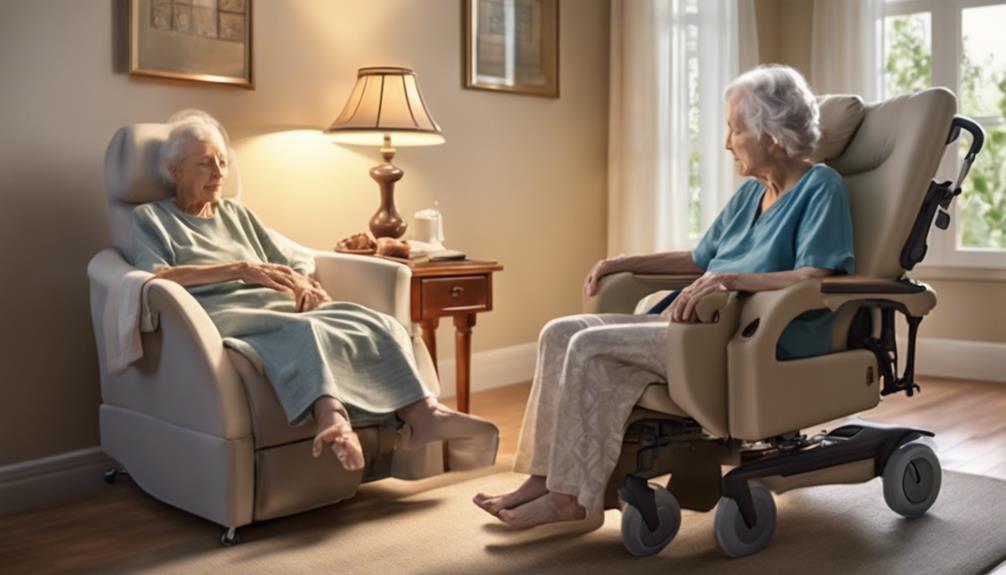When it comes to Medicare coverage for hospice care for individuals with dementia, there are specific guidelines in place to guarantee thorough assistance for those dealing with terminal illnesses.
Understanding how Medicare caters to the unique needs of dementia patients in hospice care can provide valuable insights into the services available and the eligibility criteria.
By exploring the nuances of Medicare coverage in this context, you can gain a deeper understanding of the support systems in place for those navigating end-of-life care for loved ones with dementia.
Key Takeaways
- Medicare covers hospice care for dementia patients with a life expectancy of six months or less.
- Hospice care focuses exclusively on comfort and symptom management for eligible patients.
- Services provided include nursing, therapy, social support, medication, and bereavement counseling.
- Medicare Part A ensures coverage for hospice expenses, physician costs, and necessary support systems.
Medicare Coverage for Hospice Care
When considering Medicare coverage for hospice care for dementia patients, it's crucial to understand the specific criteria and services provided under this benefit. Hospice care under Medicare is available for individuals with a life expectancy of six months or less. This coverage encompasses a range of services aimed at providing comfort and support rather than curative treatments.
For dementia patients, hospice care includes services such as medical care, counseling, respite care, and symptom management. Medicare Part A covers hospice expenses, including related physician costs, ensuring that patients receive comprehensive care tailored to their needs. While hospice care doesn't address the underlying dementia condition, it focuses on improving the quality of life through symptom management and emotional support.
Additionally, services like prescription drugs, medical supplies, and bereavement counseling are also included to ensure holistic comfort care for dementia patients and their families during this challenging time.
Dementia Patients' Hospice Eligibility

To determine if dementia patients are eligible for hospice care, it's essential to understand the criteria and certification process required under Medicare. Here are the key points to consider:
- Life Expectancy Requirement: Dementia patients must have a life expectancy of six months or less to qualify for hospice care.
- Certification Process: The patient's physician and hospice medical director must certify the patient as terminally ill to access hospice services.
- Focus on Comfort: Patients with dementia must choose to receive hospice care exclusively, which concentrates on comfort and symptom management.
- Medicare Coverage: Medicare covers hospice expenses and related physician costs for dementia patients who meet the eligibility criteria.
Benefits of Medicare Hospice Coverage
Medicare hospice coverage for dementia patients offers a comprehensive range of services to enhance quality of life and support patients and their families. Services include nursing, therapy, social services, and medical supplies. Counseling services are available for emotional support. Medicare covers inpatient and respite care, ensuring access to necessary care. Prescription drugs, including those for symptom management, are covered. Bereavement counseling helps family members cope with loss. These benefits aim to provide holistic care and support throughout the hospice journey.
Cost Considerations for Dementia Patients

As you navigate the complexities of hospice care for dementia patients, understanding the financial implications and cost considerations becomes a crucial aspect of ensuring comprehensive support for your loved one.
When receiving hospice care under Medicare for dementia or Alzheimer's disease with a life expectancy of six months, certain costs may arise. Here are some key points to consider:
- Medicare Part A Coverage: Medicare covers hospice care for dementia patients under Part A if the life expectancy is six months or less.
- Limited Coinsurance Payments: While Medicare will cover most services related to hospice care, there may be limited coinsurance payments for certain treatments.
- Room and Board Costs: It's important to note that room and board costs in facilities are generally not covered by Medicare for hospice care.
- Focus on Pain and Symptom Management: Hospice care for dementia patients primarily aims at providing pain and symptom management rather than services not directly related to the terminal condition.
Understanding these cost considerations can help you better plan and provide the necessary support for your loved one during this challenging time.
Medicare and End-Of-Life Care
Navigating end-of-life care can be a challenging yet essential journey for individuals seeking comprehensive support for their loved ones with dementia. When it comes to Medicare coverage for hospice care, it's crucial to understand that Medicare caters to dementia patients with a life expectancy of six months or less.
The focus of hospice care for dementia patients under Medicare is on pain and symptom management rather than curative treatments. Medicare Part A covers hospice expenses, including related physician costs. Services such as counseling, inpatient care, and respite care are encompassed within hospice care for dementia patients.
This care can be provided at various locations, including the patient's home, a hospice facility, hospital, or nursing facility, all covered by Medicare. By utilizing Medicare's coverage for hospice care, you can ensure that your loved one with dementia receives the necessary support and comfort during this challenging time.
Frequently Asked Questions
How Do You Know When a Dementia Patient Is Ready for Hospice?
When considering if a dementia patient is ready for hospice care, look for significant declines in physical or cognitive function. Behavioral changes, increased discomfort, and frequent infections are red flags. Consult with the patient's physician, family, and the hospice team to make the decision.
Hospice care for dementia patients aims to enhance their quality of life and provide comfort during the end-of-life stage. It's crucial to ensure the timing is appropriate for the transition.
Does Medicare Pay for Hospice Care for Dementia?
Yes, Medicare pays for hospice care for dementia patients who meet certain criteria. This coverage includes services like nursing, counseling, and medical equipment to manage symptoms and improve quality of life.
Medicare also covers respite care and inpatient care for those with terminal illnesses.
What Is the Life Expectancy of a Person With Dementia in Hospice?
When considering the life expectancy of a person with dementia in hospice, it's typically less than six months. This time frame is crucial for qualifying for hospice care, which focuses on comfort and symptom management in the final stages of dementia.
The aim is to enhance quality of life rather than cure the disease. Hospice services for dementia patients encompass pain management, emotional support, and end-of-life care, ensuring dignity and comfort in their final days.
Are Dementia Patients Eligible for Hospice?
Dementia patients are eligible for hospice care if they meet specific criteria, usually having a life expectancy of six months or less. It's important to remember that this option is available to provide comfort and symptom management for those facing the challenges of dementia.
Conclusion
In conclusion, Medicare provides comprehensive coverage for hospice care for dementia patients, ensuring they receive the necessary services for comfort and quality of life.
From doctors to medical equipment, Medicare's benefits are vital for those facing terminal illness.
Remember, coordinating with the hospice team is crucial for maximizing these benefits.
So, stay supported and informed as you navigate through this challenging time with Medicare by your side.









